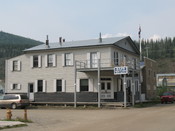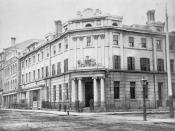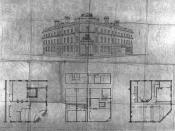War causes fear in everyone from civilians to Soldiers. The American Civil war in 1861 divided the United States of America into two sides, the Unionists in the northern states and the Confederates in the Southern States. At the same time in British North America the colonies were discussing the idea of a confederation of the colonies. There were a multitude of factors that lead to the formation of the country of Canada in 1867. One of these and also one of the most influential was the turmoil created by the American civil war.
Before the outbreak of the American civil war many exciting things were happening in British North America. In 1860 Prince Edward visited the Colonies on the first royal tour of British North America (soon to be Canada) [Stephenson, Inside of Cover]. This had the habitants of the Colonies very excited. It was the first time a major celebrity had come to British North America. The new Parliament buildings were starting to be built in Ottawa and the colonists could sense a new change. Some thought that it would be for the better while others disapproved of the confederation idea. As soon as the American Civil war became a threat, the lifestyle for many inhabitants of British North America changed greatly.
At the start of the American Civil war many British North Americans did not pay much attention. British North America declared its neutrality to avoid being on the receiving end of any abuse. However British North America still received grumbles from Northerners accusing them of harbouring Confederate "Terrorists". And The South knew that there were slaves running to Canada so they could be free. The south demanded that they be allowed to recapture their "property." British North America declined demands. To ensure British North America kept its neutrality Sir John A MacDonald introduced a New Border Police to prevent British North America from being used as a base for Confederate or Unionist operations [Stephenson, pp 18 19].
The new border police was the end result of a series of small incidences that took advantage of British North America's neutrality. One of these was the Trent affair. In 1861 a Unionist ship hijacked the "Trent" which was sailing from England to Cuba [www1]. Two confederates that were on the Trent were captured and kept in a Boston Prison. The American President, Abraham Lincoln did not want to release the two confederates because they were on a British North American boat. This made Lincoln think that British North America was aligned with the south. But when Lincoln received a request from Prince Albert that the prisoners be released, Lincoln released the prisoners without any apology for abducting the Confederates in the beginning [www1]. The Trent affair caused British North Americans to be very worried that they would be thought of as being sided with the Confederates which may lead to the Unionists attacking British North America.
Another source of fright in British North America was the aftermath of the St. Albans Raid. When Confederate solders from British North America attacked St. Albans, Vermont. They burned buildings and killed one person [Stephenson, p 19/www1]. This was another big thing that caused some problems in British North America. For Americans living in the north states it appeared that British North America was sided with the Confederates. The British North Americans knew this and were very afraid that they too would be at war with the unionists.
Also another ship-knapping incident occurred in 1863 which proved British North America's neutrality and showed that the Confederates were trying to use British North America as a base to attack the north. The unionist Ship "Chesapeake" was captured by Confederates and they took it to the Maritimes in British North America to try and sell its contents to buy arms and supplies for the American Civil war. By doing so they lured in angry unionist warship that came to retake there ship. [www1] While searching for the fugitives they looked in a Nova Scotia boat. Since both sides had broken British North American neutrality and British North America favoured neither side when giving out consequences. This showed that British North America truly was neutral and let the inhabitants rest for a bit.
All of these small occurrences created problems for British North America. People had to change their lifestyle greatly. Some joined volunteer militias while some worked in factories or built up fortifications. By the end of the 1860's 30000 militia men were active to defend against any US attack [Stephenson p 16]. British North Americans wanting to go to the USA needed to have a passport since the law was applied by President Lincoln after the St. Albans Raid. There was a great uneasiness around the border; there was some much uncertainty that people knew that at any time they could be attacked.
The regions that felt the most fear were the upper and lower Canadas along with the Maritimes and the west. If there ever was an invasion it would almost certainly come up the St. Lawrence River. The Most likely crossing spots would be at Kingston and/or Quebec and Montreal. This is where people were also the most wary. However the main concern was attacks not during the war. After the American Civil war the USA would have large armies and huge amounts of munitions. It would be the perfect time for the American Manifesto Destiny to be fulfilled.
Just before the American Civil war the United States of America had recently purchased Alaska. This made western British North America feel surrounded by Americans. Even before the USA bought Alaska there were may Americans in the west, looking for gold. The west of British North America was basically a no mans land. Excessive drinking and law breaking made it an "international waters" zone. There were as many non- British North Americans as there were British North Americans. This led British North Americans living in the west to be very wary of the Americans as they thought they might be driven out of their land by the US.
Meanwhile in the east of British North America forces were gathered and defences were built. Because everyone knew how the US would attack if they did. They would in all probability come through the St. Lawrence and work their way north and west. Life changed greatly in this area because people went to work in factories and to build forts at strategic places along the St. Lawrence.
Life was very much the same in upper and Lower Canada. People lived with the fear of attack and worked to help their colony.
All of the colonies in British North America agreed that something needed to change; they did not want to live with the fear of US attack or annexation. They turned to the government for help. The government agreed that there needed to be a change. Sir John A MacDonald was not the prime minister of Canada yet but he was on his way. John A MacDonald allied himself with George-Etienne Cartier, George Brown and other political figures to become the fathers of Confederation. Together they would turn British North America into the independent nation of Canada.
One Speech by George Brown addresses the need for Confederation to defend against any US attack.
"....I am in favour of confederation, because, in the event of war, it will enable all the colonies to
Defend themselves better....
....there is no better mode of warding off war when it is threatened, than to be prepared for it when it comes. The Americans are now a warlike people. They have large armies, a powerful navy, an unlimited supply of warlike munitions...
...the necessity of placing these in a thorough state of defence can no longer be postponed..."
George Brown
Bliss, pp 118, 119
These quotes show the determination and will of the fathers of confederation. It also shows the concern for confederation. George Brown says that confederation needs to happen soon so we can defend ourselves. These small quotes show that the people actually needed confederation.
The American Civil war was a major influence on the Confederation of Canada. As the war went on tensions along the border grew very high. The Trent affair, Chesapeake incident and the St. Albans Raid escaladed them even more. Different Regions in British North America had different response to the American Civil war. But the Nation of Canada owes thanks to those great Americans who helped it all the way.
Bibliography
Morchain, J. Wade, M. Search for a Nation: French-English
Relations in Canada since 1759, J.M. Dent, Toronto, 1967
Guillet, E. You'll Never Die, John A! Macmillan of Canada, Toronto, 1967
MacKirdy, W. Moir, J. Zoltvany, Y. Changing Perspectives in Canadian History: Selected Problems. J.M. Dent, Don Mills, 1967
Martin, W. The West and Confederation 1857-1871, The Canadian Historical Association, Ottawa, 1962
Bliss, J. Canadian History in Documents, Ryerson Press, Toronto, 1966
Murray-Beck, J. Joseph Howe Anti-Confederate, The Canadian Historical Association, Ottawa, 1968
White, P. The Charlottetown Conference, The Canadian Historical Association, Ottawa, 1970
Lunn, J. Moore, C. The Story of Canada, Lester Publishing, Canada, 1992
Stephenson, W. Dawn of a Nation, Canada's Illustrated Heratige, Toronto, 1977


